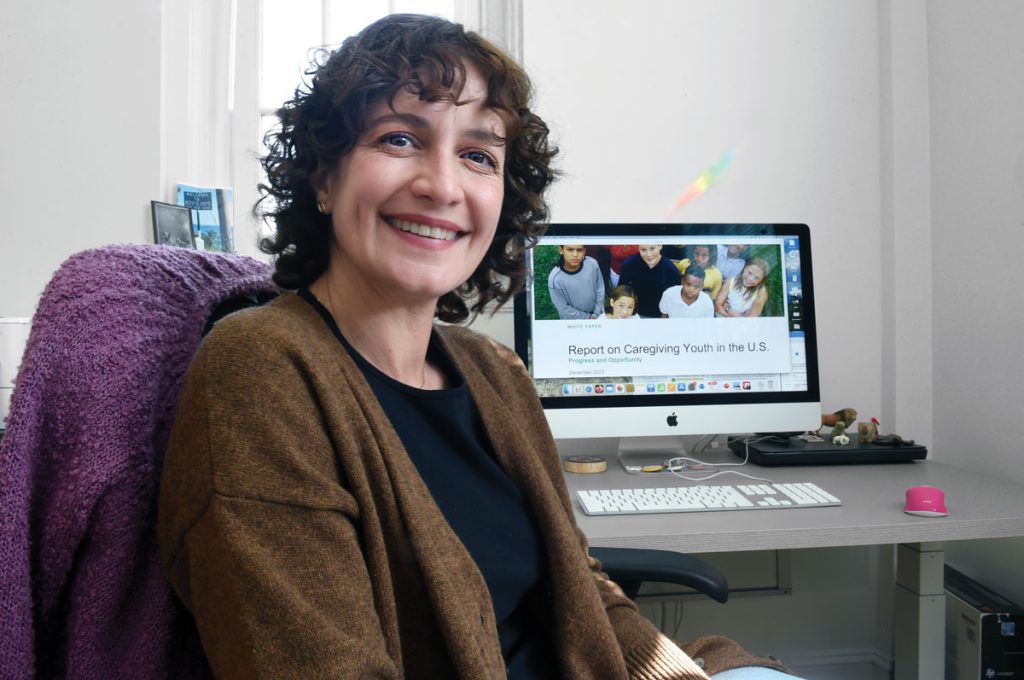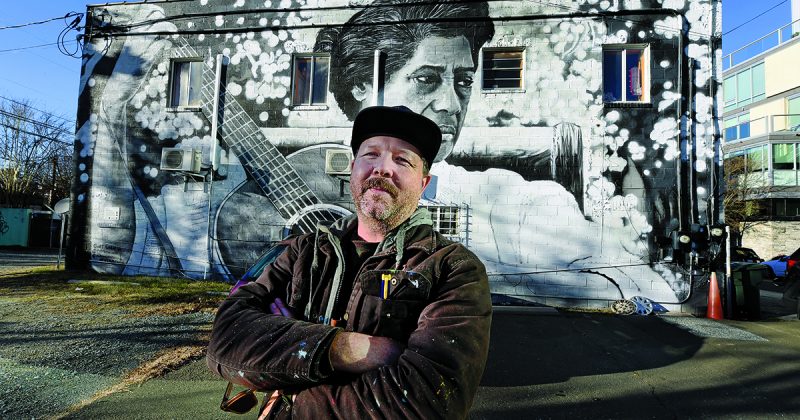
Professor Betsy Olson is a social geographer whose most recent research has examined the lives of tweens and teens who spend significant time caring for their parents and other adult relatives. (photo by Donn Young)
Professor Betsy Olson raises the profile of the overlooked and vulnerable by cultivating a culture of collaboration through a geography lens.
“I consider myself a care ethicist, a feminist theorist and a childhood and youth geographer,” said Elizabeth “Betsy” Olson, a full professor of geography and environment and global studies.
For those who associate geography with mapmaking and studying spatial dimensions, that statement might need a little parsing. Olson explains what geography means today:
“Geography is ultimately about the relationship between people and their environments,” she said. At UNC, the department is divided into numerous subspecialties, including spatial geography, health geography and cultural geography.
“My work covers an area of social geography, which is concerned with the ways in which people interact — how we create space, how we engage with institutions, policies, practices and economies,” she said.
Olson chaired the department from 2018 to 2023, and one of her last actions as chair was to change the department’s name from simply “geography” to “geography and environment” to better reflect its broad scope.
In her own research, she focuses on youth caregivers, an overlooked and understudied group. These are the tweens and teens who care for parents and grandparents — helping them get out of bed and take their medicines, for example, while also fixing breakfast for younger siblings and getting everyone off to school. Their own education may be suffering because they are too tired or stressed in class to complete schoolwork; they may miss extracurricular activities because they must rush home to resume their duties.
Olson is finishing up a National Science Foundation-funded project that examined what she describes as the “everyday geographies” of young caregivers. Along with home visits and other types of data collection on the young people, “we gave them GPS units and asked them, ‘what does your everyday look like? What is your experience as a caregiver and a student, a friend, an athlete?’ We’ve learned that there are really different experiences of caregiving,” she said.
Among the lessons learned from the research: It’s important to the youth that their caregiving roles be acknowledged. This group may need more flexibility from teachers due to the demands on them at home, Olson said.
Olson came to Carolina in 2012 after teaching at the universities of Lancaster and Edinburgh. At UNC, she helped found the Caregiving Youth Research Collaborative and used her startup funding to organize the first formal meeting of the group in Chapel Hill in 2015. The connections forged in that group have led to many important collaborations and raised the profile of the field.
Olson also enjoys teaching. In spring 2023, she taught a course she developed, “Social Geography,” which was a collaboration with performing arts laboratory Culture Mill, Southern Futures, Carolina Performing Arts and the Marion Cheek Jackson Center. The class focused on the built environment of the campus and culminated in a public “sound walk” around the Old Well and a facilitated listening circle practice.
“My goal was to help students understand collaboration, and what it means to be an academic who partners with the community. Collaboration is messy. You have miscommunications. You have points where you think you’re in agreement, and then you find out that you’re not,” Olson said. “I wanted to teach them the importance of patience, taking time to build trust across differences.”
In 2024, the American Association of Geographers recognized Olson with the 2024 Diversity and Inclusion Award, citing her work to foster inclusivity and care, her mentorship of young scholars and her recruitment and retention efforts in the department.
“I think our department has proven that people can have really different views, and that’s a good thing,” she said. “We can build a better foundation for learning and communicating and engaging when we expand what we think of as the canons of geography.”
By Geneva Collins
Published in the Spring 2024 issue | Faculty Up Close, Tar Heels Up Close
Read More

If these walls could sing
Scott Nurkin celebrates North Carolina’s contributions to the American songbook…

Cozy up to a good read: More books from College faculty and alumni
In addition to our Chapter & Verse feature poem, enjoy…


